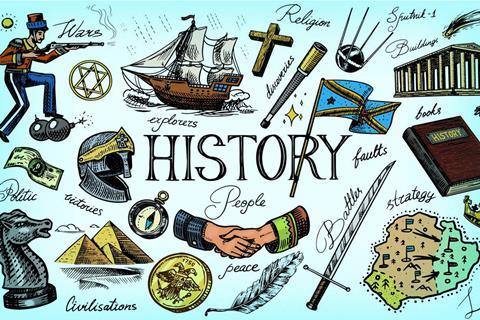Martyn Whittock believes history is an excellent topic to study in school and prepares you for life itself

’All truth is God’s truth’ St. Augustine (A.D. 354-430) Premier NexGen celebrates all that children learn at school as well as being aware that subjects are taught in a way that leaves God out of the equation. In this series looking at key subjects in the curriculum, Martyn Whittock outlines how we can study and appreciate history
‘His-story’ and ‘Her-story’
I have been fascinated by History for as long as I can remember. There are a number of different reasons why I find the study of the past so interesting and why I recommend History at GCSE, A-Level, and at university.
The first is that people are interesting! Exploring how they lived, how they thought, the kind of societies they built, is intriguing. As we do this, we are challenged to recognise both the similarities and differences that characterise them and us, and why this is so. There is always something both familiar and strange in those we study. As J.P. Hartley wrote in the novel The Go-Between, “The past is a foreign country; they do things differently there.” Discovering the extent of this similarity and difference is extraordinarily interesting.
The second lies in the recognition of the ways in which the past impacts on, influences, and (at times) constrains the present. This is not to say that our history rigidly or irrevocably predetermines our lives, but it certainly provides directions of travel, informs the narrative, and can restrict or open options. As a result, it is important to understand the past if we are to truly understand the present. This challenges us because it reminds us that we will have a legacy (for good or ill) that later generations will have to live with and negotiate. That can certainly focus the mind as we make decisions – and History reminds us of that.
The third, is the sense of community and rootedness that History brings. It constantly reminds us that we live not only in a ‘community of place’ but also a ‘community over time’. It helps explain who we are, and why we are as we are. It gives us a big picture.
The fourth is the way it challenges us to explore patterns of motivation, ideas of morality, faith, and ideology in the past. This is because people in the past reflected on the big questions as we do; they made decisions (some good, some bad). That is whether they had religious faith or not, or whether they signed up to a specific ideology or not. History encourages us to understand the deep complexity of life in the past and how people have always wrestled with moral issues and questions, even if their answers differ from ours.
History, life, careers
History is like a detective story in which we are challenged to assemble the clues, interrogate the witnesses, assess their reliability, and reach a substantiated conclusion (even if a provisional one). These constitute valuable, critical, transferable, skills.
Some students of History go on to become teachers and historians. However, the majority take these historical skills of critical thinking, balanced analysis, interrogation of evidence, clarity of expression, and substantiated conclusions, into a wide range of careers (and indeed into life generally) and are – in my opinion – better qualified and equipped because of this. The modern world needs those who are trained as historians to critically appraise it.
Faith and the challenges posed by studying History
Can we ever truly understand what happened in previous generations? Is the past a kaleidoscope of many truths in which we may recognise some of the patterns and options, but cannot really decide between them? Historians face, and engage with, these questions and need to frame answers to them.
This can be very disconcerting to young people. It can be disconcerting to older people too! Especially if their previous approach to study and ‘reading the world’ – perhaps accompanied by the preaching perspective in some churches, when it comes to the past – has emphasised (even if implicitly) the idea of there being obvious patterns to history, and God’s will being clearly revealed over time. The situation on the ground can be rather messier at times. And ways to understand and interpret the past are fluid and change over time. This is partly due to new evidence; partly to changing ways we interpret that evidence. As someone once jokingly quipped: “Only the future is certain. The past is always changing!”
My answer to this is rather old school but I think reasonable. The past can be messy, but it is appropriate to try to find out what really happened and why. And it is equally reasonable to expect to come to some kind of conclusion, even if a provisional one; ‘a truth’ that seeks to represent ‘the truth.’ We don’t have to descend into a state of intellectual relativism and indecision. A substantiated judgement, backed with evidence, is a laudable goal. Young historians who believe as I do, need not feel embarrassed about this. It is a perfectly reasonable – and intellectually defensible – position.
However, it can also be rather painful to see that the ‘goodies’ are not always behaving in a good way. Enthusiastic Christians slaughtered Jews in the Rhineland during the Crusades. The 17th-century wars of religion saw a death toll comparable with some of the worst of the 20th century. Benefactors to church and charity in the 18th century found they could live with the fact that their wealth was generated in the slave-attended sugar-boiling vats of Antigua. Vast numbers of Christians voted for far-right racist parties in the 1930s. And so on.
The answer when learning this is: don’t panic! And don’t drift into denial-mode. As a Christian historian, I am well aware that fellow believers in the past have behaved in ways that are an affront to the gospel. This does not require reading back 21st-century norms into past behaviour. Sin is sin. However, the ability of people in the past (as now!) to hijack and subvert gospel principles does not render those principles suspect or invalid. Young (and older) historians need to be as robust in maintaining this, as they are honest in recognising how often fellow believers have behaved badly. The key message is: bad Christians do not overshadow good Jesus! And many powerfully positive things throughout history were rooted in the beliefs and actions of Christians. That needs recognition too.
A Christian perspective? The study of History informed by faith
As a Christian, I believe that truth is there, and to be found and examined. My faith makes me critical and questioning, not credulous and defensive. I want young historians to feel the same.
The so-called ‘Enlightenment Values’ that are often said to underpin modern scientific study were themselves rooted in values promulgated by Christians and in a biblical outlook that took understanding the world seriously and the idea that God could be discerned through study. Faith is no more at odds with critical study than it is with science. Now, some people’s faith is – but the faith isn’t!
Finally, national myths need questioning and challenging. Christians buy into these as much as others do – but need to steel themselves to subjecting these things to rigorous scrutiny. Christian historians should be at the cutting edge of doing this, not trailing in the wake of those selling these constructions. History is a challenging subject!
Further reading
The following books may stimulate useful reflection on Christian engagement with the study of History (without necessarily endorsing all found within them):
Nathan A. Finn, History: A Student’s Guide, in the Reclaiming the Christian Intellectual Tradition Series, edited by David S. Dockery (Crossway, 2016).
Robert Tracy McKenzie, A Little Book for New Historians: Why and How to Study History, in IVP’s Little Books series (IVP, 2019)
David Lowenthal, The Past Is a Foreign Country – Revisited, Revised Edition (Cambridge University Press, 2015).




























